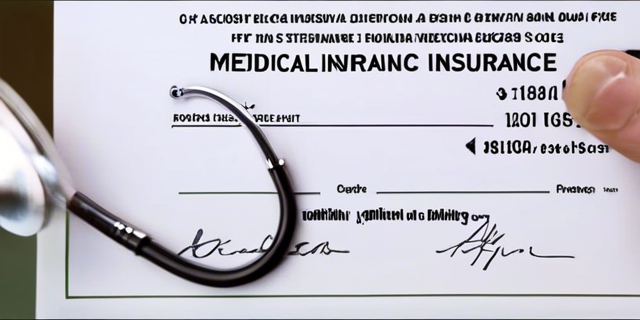Exploring Low-Cost Health Insurance Options 2024

Hey there, folks! Let’s be real – healthcare costs can be a serious budget buster. But fear not, because in this comprehensive guide, we’re going to dive deep into the world of low-cost health insurance options. We’ll uncover strategies, demystify jargon, and empower you to take control of your healthcare expenses without sacrificing quality coverage.
The Rising Tide of Healthcare Costs
Before we get into the nitty-gritty of low-cost options, let’s address the elephant in the room – the ever-increasing cost of healthcare. According to a report by the Centers for Medicare and Medicaid Services, national health expenditures in the United States have been steadily climbing, leaving many individuals and families struggling to keep up.
But fear not, my friends, for there are solutions out there that can help you navigate these choppy financial waters without compromising your health and well-being.
The Importance of Health Insurance
Let’s be real – going without health insurance is like walking a tightrope without a safety net. A single unexpected medical emergency or chronic condition can quickly spiral into financial ruin. Health insurance acts as your guardian angel, protecting you from the crippling weight of hefty medical bills.
Sure, the monthly premiums might seem like a burden, but trust me, they’re a drop in the bucket compared to the potential costs of an uninsured medical crisis. So, let’s embrace the value of health insurance and explore the low-cost options that can make quality coverage more accessible.
Affordable Care Act Marketplace Plans
Thanks to the Affordable Care Act (ACA), also known as Obamacare, individuals and families now have access to a wide range of health insurance plans through state or federal marketplaces. But here’s the kicker – depending on your income level, you may qualify for substantial subsidies or tax credits that can significantly reduce the cost of your monthly premiums.
It’s like getting a helping hand from Uncle Sam himself, making quality healthcare more attainable for those on a tight budget. So, don’t write off those marketplace plans just yet – they might just be the golden ticket to affordable coverage.
Medicaid and CHIP: Healthcare Safety Nets

For those with limited financial resources, programs like Medicaid and the Children’s Health Insurance Program (CHIP) can be true lifesavers. These government-sponsored initiatives provide essential medical coverage at little to no cost for eligible individuals and families.
Think of them as the ultimate healthcare safety nets, ensuring that no one falls through the cracks when it comes to accessing quality care. And the best part? Eligibility is determined by your income level, so if you’re struggling to make ends meet, these programs could be your gateway to affordable healthcare.
High-Deductible Health Plans (HDHPs)
Now, let’s talk about High-Deductible Health Plans, or HDHPs for short. These plans might seem counterintuitive at first, with their higher deductibles (the amount you pay out-of-pocket before insurance kicks in). But here’s the catch – HDHPs often come with lower monthly premiums, making them an attractive option for those who are generally healthy and don’t anticipate frequent medical expenses.
It’s like playing a strategic game of healthcare chess, sacrificing a higher upfront cost for lower monthly payments. But wait, there’s more! HDHPs can be paired with Health Savings Accounts (HSAs), which allow you to set aside pre-tax dollars to cover eligible medical expenses, including those pesky deductibles.
Short-Term Health Insurance Plans
Sometimes, life throws us curveballs, like unexpected gaps in coverage or transitions between jobs. That’s where short-term health insurance plans come into play. These temporary solutions can provide a safety net during those in-between periods, ensuring you’re not left high and dry without medical coverage.
Sure, they might not be as comprehensive as traditional plans, but they can be a lifesaver when you need a quick fix until you secure a more long-term solution. Just remember, these plans are designed for short-term use, so don’t treat them as a permanent solution.
Healthcare Sharing Ministries
For those with specific religious beliefs, healthcare sharing ministries offer an alternative to traditional insurance. These faith-based organizations facilitate the sharing of medical expenses among members who share similar beliefs and lifestyles.
It’s like a modern-day version of the community barn-raising, where everyone chips in to support one another. While not technically insurance, these programs can provide a more affordable option for qualifying individuals and families who align with the ministry’s values and requirements.
Employer-Sponsored Health Plans
If you’re fortunate enough to be employed, one of the most accessible low-cost options might be right under your nose – employer-sponsored health plans. Many employers offer group health insurance plans to their employees, often with competitive rates and potential contributions from the employer themselves.
It’s like getting a sweet deal just for showing up to work (well, maybe not quite that simple, but you get the idea). These plans can be a game-changer when it comes to securing affordable coverage, so be sure to explore the options available through your employer.
Cost-Saving Strategies

Alright, now that we’ve covered the various low-cost health insurance options, let’s dive into some strategies to help you stretch those healthcare dollars even further:
1. Preventive Care
They say an ounce of prevention is worth a pound of cure, and that couldn’t be more true when it comes to healthcare. By investing in preventive care, such as regular check-ups, screenings, and a healthy lifestyle, you can potentially avoid more costly medical interventions down the line.
2. Generic Medications
When it comes to prescription drugs, generic medications can be your best friend. These budget-friendly alternatives often offer the same active ingredients and effectiveness as their brand-name counterparts, but at a fraction of the cost.
3. Telemedicine Services
In today’s digital age, telemedicine services are becoming increasingly popular – and for good reason. Virtual consultations can save you time, money, and the hassle of in-person visits for non-emergency medical needs.
4. Negotiating Medical Bills
Don’t be afraid to flex those negotiation muscles when it comes to medical bills. In some cases, healthcare providers may be willing to work with you on payment plans or even discounts, especially if you’re facing financial hardship.
5. Health Savings Accounts (HSAs)
If you’re enrolled in an HDHP, take advantage of Health Savings Accounts (HSAs). These tax-advantaged accounts allow you to set aside pre-tax dollars to cover eligible medical expenses, essentially giving you a financial cushion for those out-of-pocket costs.
Navigating the Maze: Resources and Support

Exploring low-cost health insurance options can feel like navigating a maze, but fear not – you don’t have to go it alone. Various resources and support systems are available to guide you through the process:
- Healthcare Navigators: Many states and organizations offer healthcare navigators or certified application counselors who can assist you in understanding and enrolling in various insurance plans, including those offered through government marketplaces.
- Online Resources: Reputable websites like HealthCare.gov and InsureKidsNow.gov provide valuable information, tools, and resources to help you navigate the complex world of healthcare coverage.
- Community Organizations: Local non-profit organizations, advocacy groups, and community centers may offer assistance in understanding and accessing affordable healthcare options in your area.
Conclusion
Phew, we’ve covered a lot of ground in our quest for low-cost health insurance options! From government-sponsored programs to employer-sponsored plans and cost-saving strategies, there’s no shortage of avenues to explore.
Remember, securing affordable healthcare coverage isn’t just about saving money – it’s about protecting your health and well-being. By taking advantage of the options outlined in this guide, you can find a plan that fits your unique circumstances and budget, without sacrificing quality care.
So, don’t let the rising tide of healthcare costs overwhelm you. Embrace the power of knowledge, stay informed, and don’t hesitate to seek guidance from reliable sources. With determination and the right strategies, you can unlock the door to affordable healthcare and enjoy the peace of mind that comes with knowing you’re prepared for life’s unexpected twists and turns.
Frequently Asked Questions (FAQs)
1. What is the Affordable Care Act (ACA), and how can it help me find low-cost health insurance?
The Affordable Care Act, also known as Obamacare, is a federal law that aims to make healthcare more accessible and affordable for Americans. Through the ACA, individuals and families can access subsidized health insurance plans through state or federal market.
2. Can I get health insurance if I have a pre-existing condition?
Yes, thanks to the Affordable Care Act, insurance companies are prohibited from denying coverage or charging higher premiums based on pre-existing medical conditions. This provision ensures that individuals with pre-existing conditions have access to affordable health insurance options without discrimination.
3. How do High-Deductible Health Plans (HDHPs) work, and are they a good option for me?
HDHPs are health insurance plans that feature lower monthly premiums but higher deductibles, meaning you’ll have to pay more out-of-pocket expenses before your insurance coverage kicks in. These plans can be a cost-effective option for individuals who are generally healthy and don’t anticipate frequent medical expenses. However, it’s important to consider your potential medical needs and budget when evaluating if an HDHP is the right choice for you.
4. What is a Health Savings Account (HSA), and how can it help with medical expenses?
An HSA is a tax-advantaged savings account that can be used in conjunction with an HDHP. Contributions to an HSA are tax-deductible, and the funds can be used to pay for qualified medical expenses, including deductibles, copays, and other out-of-pocket costs. HSAs offer a way to save and pay for medical expenses with pre-tax dollars, making them an attractive option for those enrolled in an HDHP.
5. Can I get health insurance if I’m self-employed or a freelancer?
Yes, self-employed individuals and freelancers can access health insurance through various channels. One option is to purchase an individual health insurance plan through the government-run marketplaces or directly from private insurers. Additionally, some professional associations or trade organizations may offer group health insurance plans for their members, which can provide more affordable coverage than individual plans.

